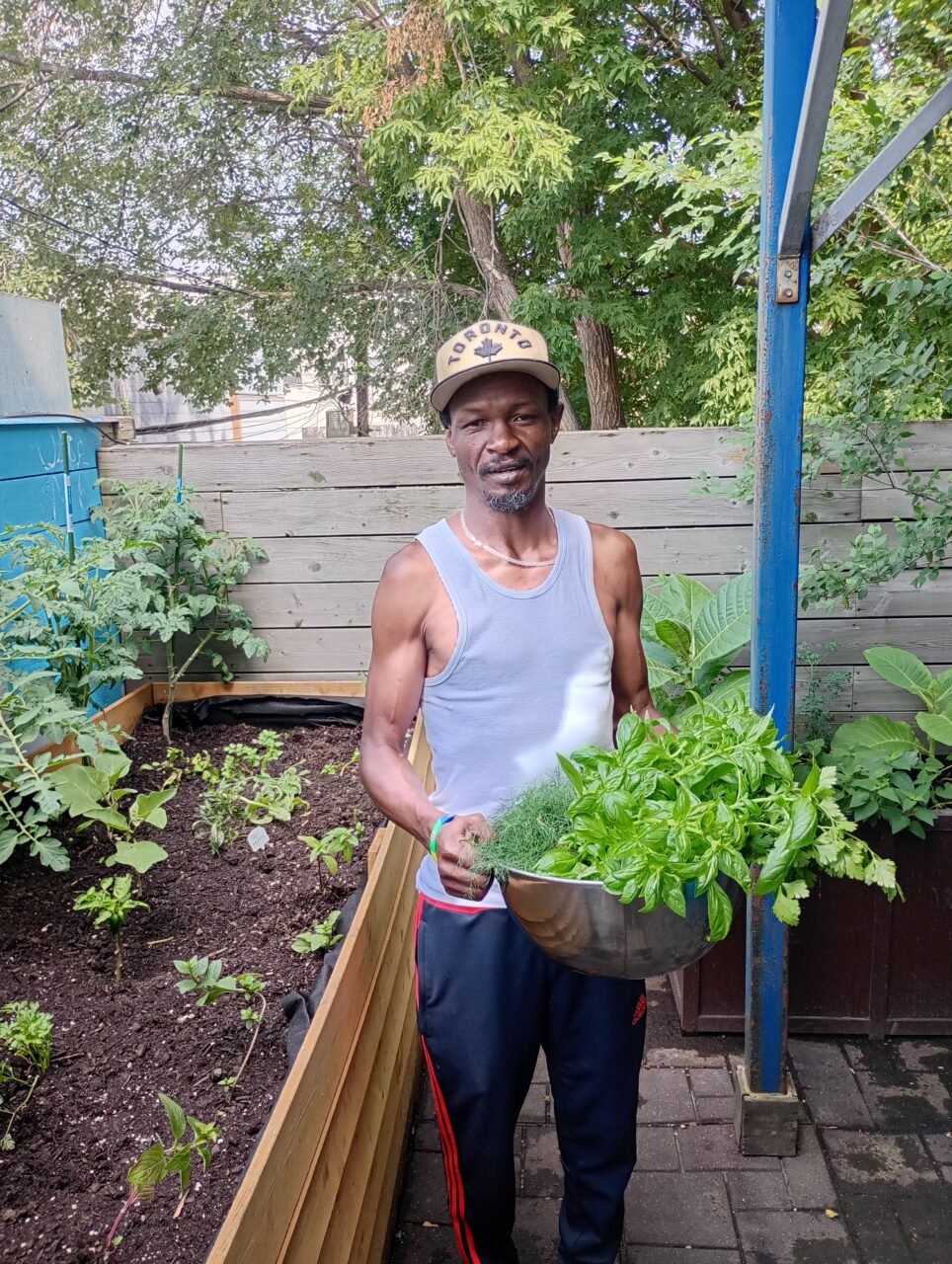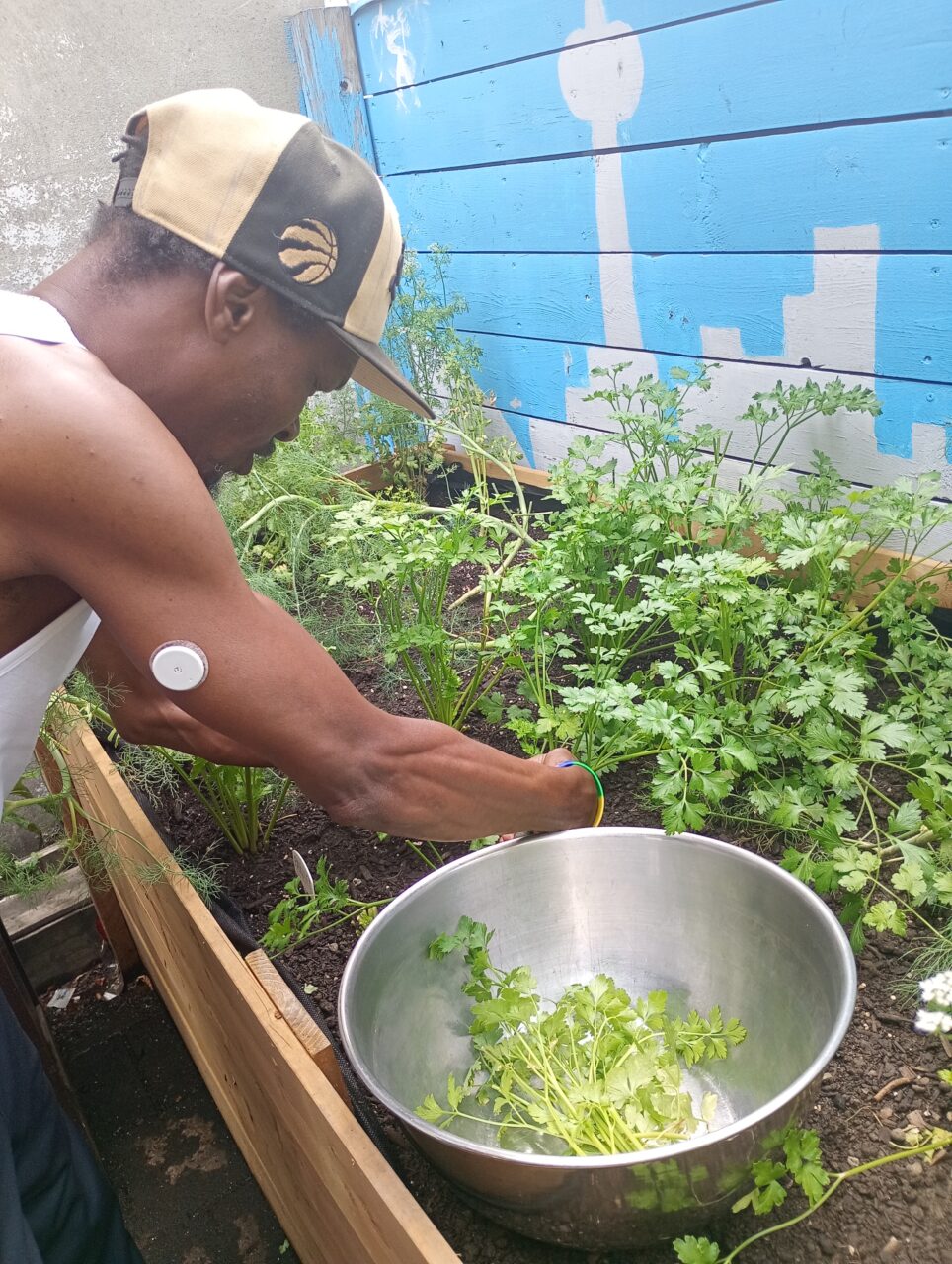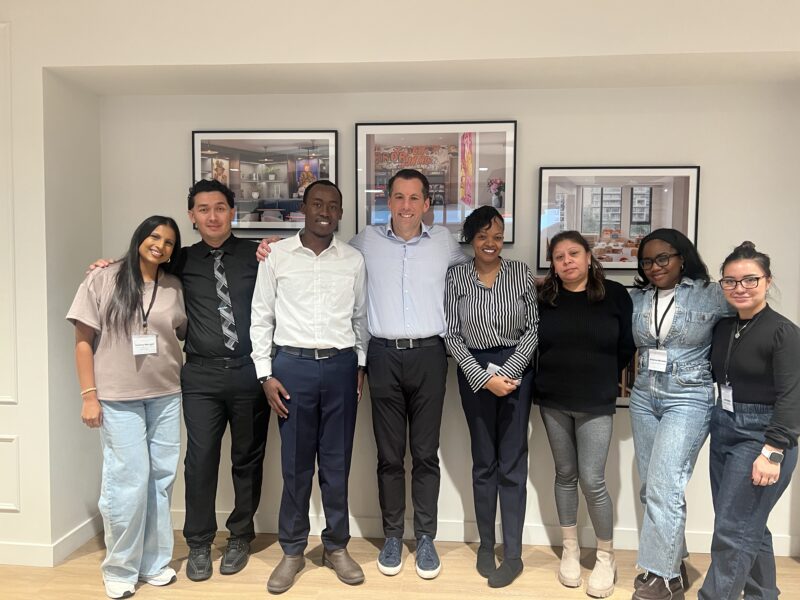Ana Cisneros, DEI Community Engagement and Programming Supervisor, HFS

The first harvest of cilantro, basil, parsley, and dill at Pacewood Shelter has become more than just a milestone in an urban gardening project, it is a living testament to resilience, cooperation, and the power of shared work. For residents, staff, and community partners, these green leaves carry the story of care for the earth, healthier eating, and the joy of doing something meaningful together. The Pacewood Gardening Project, a partnership between Homes First Society, The 519, and The Stop, has transformed the back patio into a living space of nourishment, learning, and pride. Our first harvest of cilantro and fresh herbs brought joy to everyone involved from the kitchen to the garden beds.
From Seed to Plate
When James, a resident from Kenya, first began watering the plants, he approached it with patience and dedication. Carrying buckets upstairs became a form of exercise, but also a ritual of care. “Anything you do well to this world, the world will always give you something good back,” he reflected, looking at the lush, healthy plants he helped tend. The harvest was a tangible reward: the herbs he had nurtured were now being cooked into shared meals, giving a fresh flavor to salads and sauces.
In Kenya, James’ family grew food on their land, but he emphasized that even in cities, gardening doesn’t require a big plot. He wants others to see that “you can even plant in a small area and you will get some food out of it,” whether in soil-filled bags, pots, or raised beds. His message bridges cultural knowledge with urban innovation, reminding everyone that food can be grown anywhere there is care and attention.
Cooking with Purpose

For Aikel, the shelter’s cook, the garden adds freshness, variety, and sustainability to his daily work. Using herbs harvested just steps away from the kitchen feels more natural and more inspiring than ordering in bulk from suppliers. The quantities are just right, enough to flavor dishes for the week without waste.
Basil transforms into an Italian-inspired sauce, cilantro enhances Mexican and Middle Eastern recipes, and parsley adds brightness to a range of meals. Even dill, which he uses less often, finds its place in batters and sauces. More than flavor, Aikel values the sense of pride clients feel when they see their efforts incorporated into the food they eat. He notices that the stronger aromas of freshly picked herbs invite curiosity and conversation, even among those who are new to gardening. Looking ahead, he’s eager to cook with the tomatoes, chilies, and eggplants that are on the way, imagining dishes like ratatouille and spicy stews that reflect the diverse tastes of the community.
Planting Roots in Community
Robert, from The Stop, who helped supply the herbs, describes the first harvest as “proof that the work we put in together had taken root.” For him, the garden is not just a food source, but a symbol of growth and possibility. Clients who may be navigating difficult life transitions have now seen a living example of how care and patience can produce abundance.
He’s witnessed the excitement as residents lean in to smell the cilantro, share recipes from home, and talk about what they might cook next. For some, the flavor of fresh-picked herbs was a revelation. In Robert’s view, this kind of experience is rare in urban life, where so much of the food chain is invisible. The garden restores a direct, physical connection to the earth and shows that even in a concrete-heavy environment, communities can reclaim space for nourishment and beauty.
Healthy Eating, Shared Effort
The project has also been a way to promote healthier eating habits. Fresh herbs add flavor without relying on excessive salt or processed seasonings, while vegetables like tomatoes, eggplants, and chilies will bring nutrients and variety to the menu. By producing food on-site, the shelter also reduces dependency on store-bought produce, which often arrives in bulk and loses quality before it can be used.
Beyond nutrition, the act of growing food together fosters a culture of cooperation. Residents contribute by watering, protecting plants from pests like squirrels, and sharing knowledge from their home countries. Staff and community partners support with seeds, tools, and guidance. Each harvest becomes a shared achievement, strengthening trust and mutual respect.
Looking Forward
Everyone involved envisions a future where the garden becomes not just a seasonal project, but a hub for community life. Robert dreams of meals cooked and eaten together in celebration of the harvest. James is ready to keep tending the plants, motivated by the results he can see and taste. Aikel is already planning recipes that will showcase the next wave of produce.
As the shelter’s garden grows, it is cultivating more than food it is growing dignity, agency, and connection. From watering cans to cooking pots, each step of the process is a reminder that in caring for the earth, we also care for ourselves and one another. And as James put it best, “Anything you do well to this world, the world will always give you something good back.”
To learn more how you can get involved to support Homes First programs, visit: www.homesfirst.on.ca/get-involved/
To learn more about the 519, visit: https://www.the519.org/
To learn more about The Stop, visit: https://www.thestop.org/


